by Ingrid Robeyns on January 8, 2026
I’ve been asked by a couple of friends, who have signed contracts to write nonfiction trade books, whether I have any advice on how to make sure the book gets written. I think in general non-fiction trade writing is quite a different challenge from academic writing, which I discussed here in 2022, when I was working on Limitarianism. But how does one actually make sure the writing gets done, especially if one has a job (academic or otherwise) that already consumes more than 40 hours a week and is prone to procrastination?
Here are some lessons I learnt while working on my book from the Fall of 2022 till the Summer of 2023.
First, yes, one needs dedicated time set apart. I was on leave when I wrote my book (which, under the Dutch system, is actually just holidays one has saved up for many years, but that’s a discussion for another day). I cannot imagine how I would have written the book otherwise, in such a short timeframe. To make things worse, the interest of publishers was so great (with the translation rights for half a dozen languages already sold before I started to work on the book full-time), that I felt daunted. And then, for the first time in my life, I had writer’s block. I was scared I had entered a world (–it’s an industry, really–) where I wasn’t sure I could deliver, and I was freezing. [click to continue…]
by Ingrid Robeyns on January 1, 2026

To all of you – a healthy, flourishing, and meaningful 2026!
To the world – I am less sure where to begin, since 2025 was, politically and morally speaking, one of the worst years since long. Let’s hope for peace, definitely. Responsible leaders with sound morals. Positive tipping points in climate action. A decline of all that crypto/post/neo/full-blown fascist crap that spread like a virus in 2025 (and before – but it seems to have accelerated in 2025). And therefore, I hope that many more people will become more like (a good chunk of) the commentariat of this blog – progressive, politically well-informed, and also asking perhaps the most urgent question at this point in history: what should we do? And what does the answer to that question imply for what I should do?
More and more of my friends are explicitly asking that question, but we are often unsure of the answer. Although I have some thoughts (in fact, I’m hoping to write a book on it), it is not self-evident. But it helps to not think about this question by oneself, but to raise and discuss it with friends, in organisations, and online. And if the answers seem overwhelming, I find that a one-hour walk with a dear person in the fields and the woods does wonders.
Also – I’m glad you are still reading us (and joining the discussions) after all these years, thanks.
by Ingrid Robeyns on December 29, 2025
I read a post on one of the social media platforms written by a professor who was sharing his experience with giving away ten percent of his income, after he signed the “Ten percent giving pledge” many years ago. In deciding what or whom to give to, those who take the ten-percent-pledge often follow the advice of Effective Altruism and typically end up making donations that aim to prevent malaria, deworm, or increase childhood vaccination rates, as well as give to animal welfare (which is a big topic among effective altruists).
It is truly admirable that someone consistently gives 10% or more of their income, especially given that most people don’t, and also given that this may, in absolute terms, be a sizeable sum (hence with a genuine opportunity cost). It is also good that people who give so generously write about it publicly. It could help shift social norms around giving. It may also help others who give generously but sometimes have doubts to feel that they belong to a broader community of those who give. It may inspire others to give more.
So I have only praise for giving so generously. But when it comes to choosing recipients, I make different choices. [click to continue…]
by Ingrid Robeyns on November 17, 2025
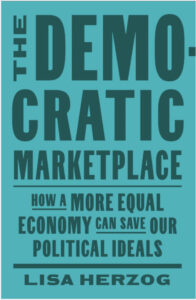 If you want to know more about how the current form of capitalism is undermining (a thick conception of) democracy, and what can be done about this, then you should read Lisa Herzog’s latest book The Democratic Marketplace. The book is written for a broad audience, and I suspect that anyone who regularly reads this blog will enjoy Lisa’s book and learn something new; and it will also provoke debate and discussion on important questions regarding the state of our economic system, our democracies, and how these two are related.
If you want to know more about how the current form of capitalism is undermining (a thick conception of) democracy, and what can be done about this, then you should read Lisa Herzog’s latest book The Democratic Marketplace. The book is written for a broad audience, and I suspect that anyone who regularly reads this blog will enjoy Lisa’s book and learn something new; and it will also provoke debate and discussion on important questions regarding the state of our economic system, our democracies, and how these two are related.
Lisa argues that genuine democracy (which is much more demanding than merely elections/counting votes) requires that democratic values be embedded in all public spheres of life. And therefore we should democratize the economy. This requires, among other things, workplace democracy, reducing economic inequality, shifting our focus from economic growth to the functions of the economy, and adopting a different policy of time that allows citizens to do the much-needed democratic work.
This Thursday 20 November, between 14:00 and 16:00 hours CET, the Visions for the Future Project is organizing an online discussion of Lisa’s book. Julie Rose and Tom Parr will kick off with comments. The online book workshop will take place via MS Teams. To get the link (which you will get within the next working day after registering), you can register via the link on the bottom of the event’s announcement page. Enjoy the reading, and enjoy becoming inspired to take (more) civic action by reading (and discussing) Lisa’s book!
by Ingrid Robeyns on November 10, 2025
With another COP starting today, and the question of climate change having played no role at all in the Dutch elections recently, and, well, for a zillion different reasons – it seems like a good time to ask the question: what books can help to make people move on this topic? (or if you think books are the wrong medium, and we should only look at TikToks or cinema movies or Netflix series, I’d love to hear arguments for that view too).
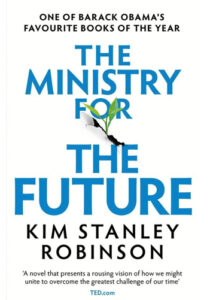 To me, the most magnificent fiction book on climate change is Kim Stanley Robinson’s The Ministry for the Future. It is phenomenal. I hadn’t read it yet when Henry organised a seminar on the book here at Crooked Timber, but I can only say: do read it. Admittedly, the book is very long – and this might be asking too much of many people, given the very many other demands on our lives. But there’s an easy solution: listen to it. This book is perfect as an audiobook. You listen while walking, and you’ll gradually get through the entire book while enjoying your daily walk. Given the many different voices in the book, it might even be better as an audio-book than to read it from paper/screen.
To me, the most magnificent fiction book on climate change is Kim Stanley Robinson’s The Ministry for the Future. It is phenomenal. I hadn’t read it yet when Henry organised a seminar on the book here at Crooked Timber, but I can only say: do read it. Admittedly, the book is very long – and this might be asking too much of many people, given the very many other demands on our lives. But there’s an easy solution: listen to it. This book is perfect as an audiobook. You listen while walking, and you’ll gradually get through the entire book while enjoying your daily walk. Given the many different voices in the book, it might even be better as an audio-book than to read it from paper/screen.
But since The Ministry for the Future already was discussed at length here, let me focus on two other books that might help to centre our awareness and political debates on climate change: Eleanor Catton’s Birnam Wood and Kimberly Nicholas’s Under the Sky We Make. The first is fiction, the second is non-fiction for citizens. Attention: one spoiler about Birnam Wood under the fold. [click to continue…]
by Ingrid Robeyns on September 22, 2025
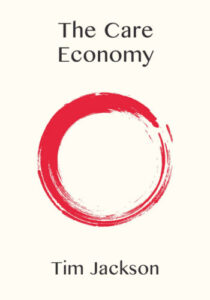 I’m in the midst of doing research, teaching, and outreach activities on a set of questions around economic growth and its relationship to what we value. My research team has Tim Jackson visiting tomorrow, who will give a talk on postgrowth economics and also talk a bit about his new book, The Care Economy. The main claim of that book is that the economy should not be about welfare understood as GDP per capital, with the corresponding economic policy goal being economic growth. Rather, the economy should be about people’s health (using the WHO definition, which I interpret as ‘well-being’), and hence economic policy should be about what we do to preserve and improve our health, which is care – care for ourselves, for others, for the planet including its ecosystems that allows us to live well.
I’m in the midst of doing research, teaching, and outreach activities on a set of questions around economic growth and its relationship to what we value. My research team has Tim Jackson visiting tomorrow, who will give a talk on postgrowth economics and also talk a bit about his new book, The Care Economy. The main claim of that book is that the economy should not be about welfare understood as GDP per capital, with the corresponding economic policy goal being economic growth. Rather, the economy should be about people’s health (using the WHO definition, which I interpret as ‘well-being’), and hence economic policy should be about what we do to preserve and improve our health, which is care – care for ourselves, for others, for the planet including its ecosystems that allows us to live well.
Now, contrast this with the first “mission” taken from the election manifesto of the Dutch VVD, which is the Dutch right-wing party, which sees itself as the defender of classical liberal values, democracy, rule of law and so forth. (note aside: many critical commentators see the VVD increasingly as a populist extreme-right party, but I won’t look into that yawning gap now).
The first mission of the VVD is: Radical Economic Growth. [click to continue…]
by Ingrid Robeyns on May 12, 2025
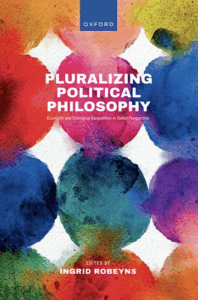 Over the last years, I have edited a volume of papers on the question how to make analytical political philosophy more inclusive, with a particular focus on the debates on economic and ecological inequalities. The starting point was the observation that analytical political philosophy has for a long time been criticised for marginalizing (to a greater or lesser extent) certain voices and perspectives. Some of these voices and perspectives are internal critics of the liberal tradition – think of the feminist critiques or the critiques by care ethicists. But there have also been external perspectives that have been largely ignored, in particular perspectives from outside the western traditions. While there are well-developed specialist literatures on all of these traditions, they tend to be studied mainly by specialists. Non-western political philosophy and the internal critiques of liberal political philosophy are still too often overlooked in the field. My own estimation is that things are getting better – but very slowly, and hence I wanted to edit a book to make another small contribution to these collective effects to make political philosophy more pluralistic. [click to continue…]
Over the last years, I have edited a volume of papers on the question how to make analytical political philosophy more inclusive, with a particular focus on the debates on economic and ecological inequalities. The starting point was the observation that analytical political philosophy has for a long time been criticised for marginalizing (to a greater or lesser extent) certain voices and perspectives. Some of these voices and perspectives are internal critics of the liberal tradition – think of the feminist critiques or the critiques by care ethicists. But there have also been external perspectives that have been largely ignored, in particular perspectives from outside the western traditions. While there are well-developed specialist literatures on all of these traditions, they tend to be studied mainly by specialists. Non-western political philosophy and the internal critiques of liberal political philosophy are still too often overlooked in the field. My own estimation is that things are getting better – but very slowly, and hence I wanted to edit a book to make another small contribution to these collective effects to make political philosophy more pluralistic. [click to continue…]
by Ingrid Robeyns on March 8, 2025
The Guardian reports on marches and protests across the globe to celebrate International Women’s Day. Three cheers for all feminists who took to the streets today to remind us that women’s rights should never be taken for granted; in fact, as The Guardian discusses, women’s rights are under severe pressure. And given the rise of fascism and other forms of authoritarianism everywhere, we have ample reasons to worry that they will be rolled back even further. After all, it is no coincidence that one of the first victims of Victor Orban’s rise to power in Hungary was gender studies; and that one of the first things Donald Trump did was to abolish all DEI (Diversity, Equity and Inclusion) policies. His vicious attacks on nonbinary and transpeople should be understood in the same light, because what nonbinary and transpeople do by claiming their identities, is to reject the traditional strict binary gender ideologies that anti-feminism requires, with clearly described roles for men and women. We are not only living in times of democratic decline; we are living in times of anti-feminist setbacks – and in those times, protests are vital to bring oxygen to organized resistance (feminist and otherwise). To all those who went on the streets today – thank you!
by Ingrid Robeyns on February 28, 2025
Two months ago, I saw No Other Land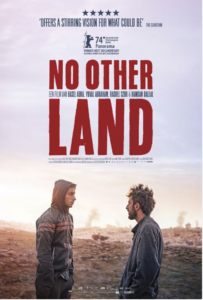 in a large movie theatre in Brussels. No Other Land is a documentary made by a team of two Palestinians and two Israeli.
in a large movie theatre in Brussels. No Other Land is a documentary made by a team of two Palestinians and two Israeli.
We follow their reporting on the years-long destruction of Masafer Yatta, a village on the Palestinian Westbank, by Israeli forces. The Israeli State, backed up by its army, orders the villagers to leave the land because the land will be used by the army for training; but the villagers have lived there for generations and are the owners of the land. As one woman says, “there is no other land” they could go to.
The documentary was at the same time horrible and beautiful. [click to continue…]
by Ingrid Robeyns on January 1, 2025
Here’s a virtual toast to your flourishing in 2025. But more so than any other year, our wishes should not just be from person to person, but rather wishes for societies – and the society of societies, global humanity. I haven’t felt so gloomy about politics, broadly defined, in a very long time. A genocide is happening while all of us can see it, and mainstream politics and society tries every trick possible to rationalize and justify what is happening. Our politicians are failing to get us off the path to the deadly collapse of Earth’s ecosystems. The rise of autocracy and fascist policies has now reached such levels that we may start to wonder why so many in the generations of our parents and grandparents risked, and often sacrificed, their lives to free us from fascism – only to give us the freedom to vote the authoritarians and the fascists back into power.
(I deleted all the swear words I included when I wrote the first draft of this post. But I confess, these days I swear a lot when I think and write about politics).
So what to do? There are at least three options: Fight, flee, or freeze. The last one would amount to just let it happen, and hope for the best – that technologies will save us, that democracies are resilient, that we are exaggerating the dangers. Well, I am not sure… is this position supported by the facts? I doubt it, and the risks of being too optimistic or naïve are too large, in my view.
The second, flee, would be to acknowledge the dangers but stop being politically engaged, or not take up the opportunity to become politically engaged, because one doesn’t want to be involved – too risky, too burdensome, too much of a hassle. One can flee into the the world of shopping-malls and consumerism, or the world of yoga and meditation retreats, or just go off-grid and live a simple life in Walden. Or become obsessed with money and one’s own social status. Fleeing certainly has its attractive features – to avoid having to be stressed and risk activists’ exhaustion, and just simply to have an easier life. But except if one does not care that something similar to Apartheid or genocides could reoccur, or that Russian-type “democracy” might spread over the world, it is a position whereby one freerides on the efforts of others to engage in the resistance to evil. [click to continue…]
by Ingrid Robeyns on December 9, 2024
A few weeks ago, seven political philosophers at my department, who regularly meet to discuss issues related to sustainable futures, met to discuss Hannah Ritchie’s book Not the End of the World. That book quickly appeared on the bestseller’s lists. For everyone who read her book, or is perhaps thinking about reading her book, here’s what we thought about it (which, regular readers of this blog will notice, is an example of Team Philosophy which we discussed here a while ago.)
Our review can be found below the fold.
[click to continue…]
by Ingrid Robeyns on December 5, 2024
Editors of academic journals have been reporting that they find it increasingly hard to secure referees for papers that have been submitted to their journals. When I’ve been discussing this issue over the years with colleagues, I’ve heard a few remarks that made me wonder what our considerations are to decide whether or not to accept a review request. Clearly, there must be a content-wise fit: if one thinks the paper is outside one’s area of expertise, one should not accept the referee request. But then I have heard considerations such as “I decline because I have already refereed for this journal before”, or “I referee as many papers as I receive reports”, or “I referee 5 papers a year”. Are these valid reasons to decline?
Clearly, the answer cannot be that how much we choose to referee is purely a private affair. All academics would benefit if there would not be a shortage of referees, hence it cannot be a purely private affair. Yet the referee shortage takes the structure of a collective action problem. And we know that there are two principle ways to address collective action problems – either by having a collective decision maker (such as the government), which is not a solution available for this problem; or else by way of establishing a social norm.
Solving the referee crisis in academic peer review will require multiple measures, but when it comes to securing that enough people are willing to referee, I propose to discuss the number we should treat as the lower boundary of how much we should referee. Let’s call the number of reports a person writes for journals divided by the number of reports that person receives in response to their own paper submissions a person’s referee-ratio. I want to defend that the referee ratio should be at least 1.2. In other words, for every 4 reports we receive, we should write at least 5 (adjusted for the number of authors of a paper). [click to continue…]
by Ingrid Robeyns on November 24, 2024
by Rutger Claassen and Ingrid Robeyns
Let’s establish an upper limit on the personal wealth any individual can possess. This is the core principle behind ‘limitarianism’. Limitarianism represents one of the more radical proposals in the debate on wealth inequality. Over the past few years, one of us has developed the philosophy of limitarianism (first in the academic realm, and then more recently also in the public sphere, as regular readers of this blog know). The proposal has since been endorsed, and in some cases further developed, by other scholars and writers, including Thomas Piketty and the Dutch journalist Sander Heijne.
Of course, not everyone likes the idea. One of the most important critiques on limitarianism is that it is unclear whether company owners can continue to hold on to their flourishing businesses in a limitarian world. Or no longer being able to receive exceptionally high pay for running these companies. Think, for example of the $46 billion compensation package Elon Musk received for serving as Tesla’s CEO.
Annemarie van Gaal, described as one of the most well-known businesswomen in the Netherlands and columnist for the influential Dutch newspaper De Telegraaf, claims that with a wealth cap, there will no longer be any business activity:
“But anyone who is willing to take significant risks, endure immense stress, and sacrifice sleepless nights to apply their talent and perseverance in order to reach the top, should be given free reign. These people are the ones who create jobs and ensure that our country remains among the wealthiest in the world. (…). Would top entrepreneurs still be willing to sacrifice years of their lives, take countless risks, and endure hardship if they knew in advance that there’s a limit to their success? No. We will never become a happy society if we allow this.”
But is this correct? Can business owners remain owners of their business under limitarianism? And can their businesses thrive? This is an important question. Because even if there are strong moral arguments for limitarianism, they are not worth much if limitarianism destroys the economy. [click to continue…]
by Ingrid Robeyns on November 9, 2024
Together with many other academics in the Netherlands, I have been very busy in organizing a nation-wide demonstration next Thursday against the 1 billion budget cuts to higher education that our very-right-wing government has announced. (For background explanation, see this earlier post).
Today, I have a long opinion piece in the daily newspaper NRC Handelsblad analyzing the crisis in higher eduction. For our non-dutch speaking colleagues, and anyone with an interest in this matter, my colleague from the law department Bald de Vries edited an AI-based translation (to which I made a few further tweaks) – you can find it below the fold. [click to continue…]
by Ingrid Robeyns on September 6, 2024
 In response to my previous post on the imminent threat to Dutch universities to have their budgets cut with up to 1 billion euros a year, I received a few emails from (mainly younger) staff to ask how they could contribute to the protests.
In response to my previous post on the imminent threat to Dutch universities to have their budgets cut with up to 1 billion euros a year, I received a few emails from (mainly younger) staff to ask how they could contribute to the protests.
I will respond specifically for the current Dutch case, but I think we could learn from international experience here. So if you have additional thoughts on what university staff could do to make sure the material conditions in which they need to do their work are adequate (and for public universities this means not having their public budgets cut in a way that creates inadequate funding), then please do share your suggestions.
[click to continue…]






